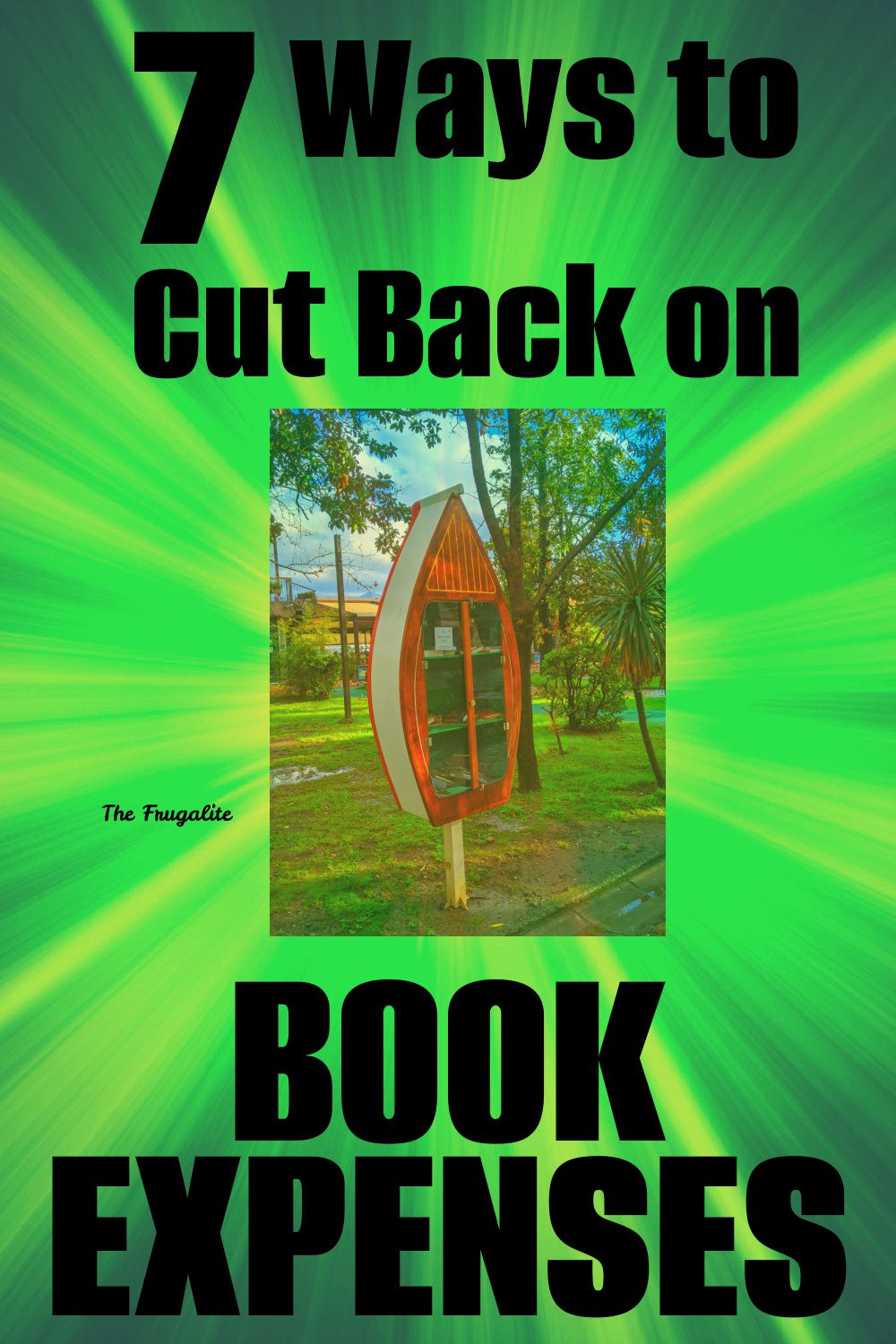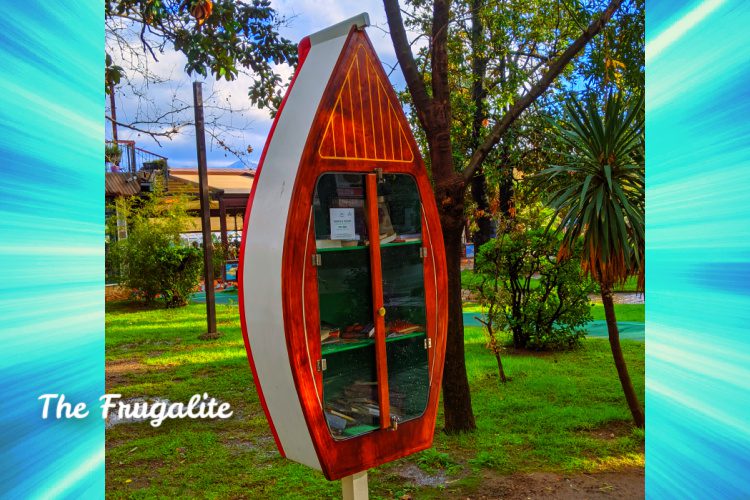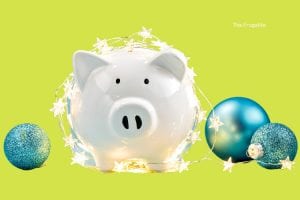(Psst: The FTC wants me to remind you that this website contains affiliate links. That means if you make a purchase from a link you click on, I might receive a small commission. This does not increase the price you’ll pay for that item nor does it decrease the awesomeness of the item. ~ Daisy)
By the author of The Faithful Prepper and The Prepper’s Guide to Post-Disaster Communications.
So you have a bit of a book problem. You’re most certainly what you would consider a bibliophile, but you’re trying to cut back on expenses.
Yeah, you’ve tried the library, and they do have what you want occasionally, but you find yourself, again and again, staring at your credit card statement in awe at the sheer cost of all the new books that you’ve just bought. Your habit is taking a rather large bite out of your monthly budget, and you know you need to cut back, but you don’t know how to do so without going miserable.
Here are a few ideas to help you to continue to have new material to read without breaking the bank.
ThriftBooks.com
This is my go-to resource for used books – and buying used is the key here. You will not save money buying fresh-off-the-press books. You have to buy used. ThriftBooks is a good means of doing so. I’ve found that their selection is pretty decent (though not as large as Amazon’s), and I can sometimes find books here that I couldn’t find elsewhere as well.
You build up points with each purchase you make here as well, so you can end up getting free books after you spend a certain amount of money as well. My understanding is they’re not associated with Amazon at all either. If you’ve been trying to avoid giving your money to Jeff Bezos, that’s something to consider here.
AbeBooks.com
I’ve used AbeBooks in the past extensively, and they have a very similar flair to ThriftBooks. I’ve never understood the purpose of this business move, but they are owned by Amazon. Why Amazon is a bookseller but also owns another site solely devoted to selling books is beyond me.
So while you can typically always find good deals here, that may be a deciding factor in whether or not you’ll shop here.
Amazon
If you’re going to shop for books on Amazon, you have to buy them used if you want to save yourself any money. If you end up buying everything here new, you’re only going to end up helping to starve your wallet. I’m not aware of any reward system here either that gives you free print (not Kindle) books after you purchase X amount either.
The cool thing about buying used on Amazon is that you can often find ‘like new’-grade books for just a dollar or two more than the beat-up copies. If you need to cut back on book expenses, this is a good way to do so.
Goodwill
Few seem to know that Goodwills across the country regularly have some of the greatest book selections out of any store in town. You can often pick up brand-new hardbacks here for a dollar. It takes a bit of perusing when you’re here to find something you may actually like, and that’s not for everyone, but you can walk away with some fantastic deals here.
Antique Malls/Flea Markets
These tend to be more expensive than Goodwill, but antique malls typically have books available for sale pretty cheap. They’re not all ancient, either. I regularly find books that are only a few years old in antique malls all around my area.
As long as the vendor is paying the antique mall the booth fee, antique malls tend not to care what the vendor is selling. They could be selling copies of the Twilight trilogy for all the antique mall could care, just as long as they’re getting their money in every month. It’s because of this that these are great places to peruse through for semi-cheap books.
Your local bookstore
The keyword here is ‘local.’ If you go to a major retailer, you’re going to end up paying a lot more money. If you run into the local mom-and-pop, the shelves tend to be filled with cheap, used books that you can often pick up for just a few dollars.
Overall, I have noticed that people in the book business know what it is that they’re selling – you’re not going to walk out of here with a $50 for $2 like you will from Goodwill – but you can still score one heck of a deal.
Typically, I’ve found that fiction, biographies, and history are the best deals you’ll find in these shops. And considering that a lot of these stores have rewards programs that give you a free book for every ten you buy or so, you can save quite a bit of money per year by regularly perusing these aisles.
Little free bookstores
These are the little birdhouses stuffed full of books that are scattered throughout your community. You can find them everywhere, and taking a book out of one is absolutely free. Sometimes it’s recommended that you replace one book for every book that you take out, but it just depends on the box.
Either way, this can serve as a great place to get inexpensive books.
Are there other places you would recommend to bibliophiles?
Books are expensive, and with inflation ever-increasing, they’re only going to grow more so. Thankfully, there are recourses you can turn to to help protect your monthly budget. What are your thoughts, Frugalite bookworms? Are there other resources to turn to that you know about we didn’t discuss above? Let us know in the comments below.
About Aden
Aden Tate is a regular contributor to TheOrganicPrepper.com and TheFrugalite.com. Aden runs a micro-farm where he raises dairy goats, a pig, honeybees, meat chickens, laying chickens, tomatoes, mushrooms, and greens. Aden has four published books, The Faithful Prepper, An Arm and a Leg, The Prepper’s Guide to Post-Disaster Communications, and Zombie Choices. You can find his podcast The Last American on Preppers’ Broadcasting Network.












10 thoughts on “7 Ways to Cut Back on Book Expenses”
Many public libraries have Friends of the Library that hold either weekly or twice annual used book sales. The books are either donated or are discards from the library. I’ve come out from either type with a huge bag full for less than $25 .I watch closely for dates of sales.
Dropping by your local Goodwill or other thrift store certainly sometimes produces some real gems worth of very low cost book deals. It is, however, a very random process. Here’s a way to tailor your book searching for topics of special interest.
First run a search on Amazon in the books category using such topic searches as GARDENING BOOKS, or INFLATION SURVIVAL BOOKS, or HOME DEFENSE BOOKS, or whatever general topics of interest are relevant for you. Amazon is very good about displaying a variety of titles that they carry — which is a lot.
When you find titles that may be worth chasing down, be sure that when you save a record of their title, author, edition varieties (paperback, hardback, Kindle, whatever, and possible 1st edition, 2nd edition, etc) that you save the publication date. If the publication date is more than 6 months older than today’s date, that title and edition is fair game for a usually free inter-library loan request. It can help your librarian if you also recorded the publisher’s name and ISBN number, etc. The US inter-library loan system has been around gloriously since the late 1800s and often doesn’t get the credit it so wonderfully deserves. [It’s not available to expats living in other countries.]
There are only a few book types that libraries won’t do such loans on — such as expensive reference titles or very rare, sometimes very old, and hard to replace titles, etc You can’t always tell from the Amazon reviews if a book will be worthwhile for you personally, whether it will be strictly a one-time read that’s sufficient for you, or whether you will (after reading) determine that you will likely want to refer to that book from time to time (which could justify owning that title).
Once you’ve had an opportunity to do a one-time read (or even just a quickie scan through), you can more easily decide if you want to buy your own copy, or make do with a Kindle edition (if available), or (and maybe AND) make a scanned digital copy of that book for your own personal use (which since you’re not planning to sell it, there’s no copyright violation issue).
Reasons for having a digital copy could include either a short term or even a very long term bug-out [including an INCH type bug-out which is the acronym for “I’m Never Coming Home”] where bringing along your enormous library of print books might be simply impossible or ridiculously expensive — but having thousands of such titles on a dirt cheap flash drive might solve that problem if you can also bring along your electronic gadget(s) to read that flash drive.
How could you do a digital scan of such print books? There is a global community of DIY book scanner and builder enthusiasts that connect with each other via this website:
https://diybookscanner.org/
Some of their relatively inexpensive-to-build designs even show up on YouTube
Warning: Don’t do business with some book scanning companies that insist on cutting off the spine of print books so the pages will lay perfectly flat on their scanning equipment. You get only the digital scan back — but never the original print edition.
Back to hard-to-find books for a moment. Despite Amazon’s obvious monopoly-wannabee efforts, they don’t have a global monopoly on book sales. You can often learn where book sellers around the world are listing both new and used titles by searching on this misleadingly-named website (that has never ever been limited to just school text books):
https://www.gettextbooks.com/
You’ll learn you can search there by title, author, ISBN and sometimes even by subject. Often you will turn up a global spectrum of prices for both new and used titles. In some cases you might even find some sellers willing to rent book titles to you!
Now do you know more about book finding than Amazon ever wanted you to know [grin]?
–Lewis
An article after my own heart!
FREE BOOKS: one nearby library has 2 shelves of Take One/Leave One. Generally the nicer books are inside, but out under the covered entry area is another. One day I was there and didn’t have anything to leave (I will now always have a couple in the trunk of our car) and the librarian assured me that it wasn’t necessary. I was going to buy a couple from the For Sale shelf to leave because there were some free ones that I really wanted. And as Aden said, there are the little birdhouse type boxes in neighborhoods.
Put the Word Out: Tell your friends and family that you’re trying to build your library and if they have any to get rid of, you’ll take them off of their hands. I’ve known people who actually throw their books away (!) when they’ve read them. You can use these as swaps if they’re something you don’t want to keep.
Bookstore Free Bins: McKay’s in Knoxville, Tennessee is not a superstore of used books, movies and games, but also has 3 or 4 large bins out front of free books. Sometimes the items are put in there by the store, sometimes it’s a customer who had books that they couldn’t get trade credit for. I’ve gotten some wonderful books from their bins. I’ve seen free book boxes out in front of other stores, also.
Dumpster Diving: we live out in the country and many homes out here have dumpsters out by the road. One particular place used to have their dumpster full of books. I mean FULL. The lid was propped open and we could see them driving by. Sometimes they were mostly old textbooks and encyclopedias, but once I scored a nice copy (signed by the author) of the book that the movie Monuments Men was based on!
Gifts: If someone asks what you want for Christmas or a birthday, send them to your wish list on amazon (make sure it’s set to public). I never buy books from amazon directly, although I do buy from individual sellers sometimes. One note about this though, make sure they’re books you know you want. I really hate to waste book opportunities.
Used Bookstore Trade-Ins: I love to shop at Half Price Books, but not trade in. They’re extremely picky and offer almost nothing. However, a local coffee shop had a used bookstore area and I was able to trade in enough to actually get 3 free books, one of which had been on my wish list for a long time.
Garage Sales: occasionally they’ll have a free box. Although for the sake of good will, try to find something to buy so they don’t feel taken advantage of.
*I meant to say that McKay’s in Knoxville is not ONLY a superstore of used books. Really fun store, except during the mask nonsense. One of the clerks was a real Karen.
CHEAPER BOOKS: Many libraries have a shelf of used books for really cheap. When we used to travel, I always tried to visit the local library wherever we were and I was pleasantly surprised to see their discounted books. A book makes a great souvenir.
Used Bookstores: I mentioned Half Price Books and McKay’s in my earlier comment. Some of their used books aren’t a bargain, but if you’re not in a hurry and looking for a topic, rather a specific title, great discounts can be found. I’ve bought hardbacks for as little as .50.
E-BAY: As I said earlier, I won’t line the pockets of bezos but I do use the shopping cart as my own personal wish list. A few years ago, I could frequently find books on amazon for .99 but not anymore. So I check my list, then see if it’s on ebay. I can almost always find it cheaper on there. For instance, I was able to find a bundle of 4 M.C. Beaton cozy mysteries for $9.99 with free shipping. The cheapest I could find the same books when I was at McKays, was $3.99 and up. I want to own copies of them because I don’t get to the library often and I re-read them after 2 or 3 years.
Library Sales: Get there early if you want a good selection. However, if you want to gamble on it, wait until the last day of the sale, and close to closing. Sometimes you can get a whole bag of books for $10.00.
I’ve used the library my whole life, but the one in our nearest town closed a few years ago. We can have a card at any library in our county,which is great, but now the nearest one is 8 miles away. Our son pointed out that with the price of gasoline of 2 trips to the library (to check it out, and then check it back in) it’s cheaper to buy the book. It hurt my frugal sensitivities, but I did the math and he was right. And boy do I know the cost of overdue fines.
I’m in a book club that reads 5 books a year. I buy used ones and share with my friend. That way, the book is half of the used price. This last year, they picked a book I recommended and my copy was one I won in a Facebook contest. Amazon has lots of free books too. Prime members get a free digital book every month from a curated list. You add them to your kindle app. Also, put free (type) book in the search engine to load to your kindle app that is free. I have the app on my phone and my table and can switch back and forth.
BookFinder.com is also a good way to find books that are hard to procure. They are a conglomerate of many bookdealers from over the world. I have gotten a couple of books from England for about $4 US(postage included).
I will often have Amazon open and check out the comments of people who have bought the book to see what they have to say plus it gives a description of the size of the book and the ISBN number. It has saved me a lot of money over the years to see if people generally like the book or not.
Good advice about checking the reviews. Mostly, I read the 1 and 2 star reviews and rarely read the 4-stars. Usually people are specific about why they don’t like a book: poor grammar, misspelled words, bad editing, story wanders, etc. Sometimes the 1 star reviewers didn’t like a book for precisely the reason I would like it (atheists don’t like books with a Christian theme or the politics are too conservative), so they ended up helping me.
I’ve read glowing reviews in the 4 star category of books that I hated. I mean really hated.
For those who live near a Bookmans, they do a lot of book trading. You get a quarter of their assessed value in cash or half in trade value. Their book prices aren’t too bad, and they also sell things like musical instruments and games. So if you have old DVDs, electronic games, board games, or instruments that are collecting dust you can get cash or trade to use at their store.
Last I checked a library card was free. My eighty-something parents use their county library all the time.